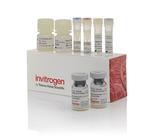Search Thermo Fisher Scientific
FIGURE: 1 / 4
Mouse IL-1 alpha ProQuantum Immunoassay Kit
(A) Antibody-antigen binding: Antibodies bind to two separate epitopes on the antigen (during a 1-hr incubation), which brings the two conjugated oligonucleotides into close proximity. (B) Ligation and amplification of signal (in a qPCR instrument): DNA ligase and a third splint oligonucleotide connector are added to ligate the two ends of the conjugated oligonucleotides, creating a 100-base DNA template. Once the ligase is inactivated at 95°C, the sample is amplified through 40 cycles of annea... View More




Product Specifications
Analytical sensitivity
Assay range
Sample type/volume
Hands-on time
Time-to-result
Homogenous (no wash)
Instrument
Product size
Contents
Antibody-Conjugate A
Antibody-Conjugate B
Antibody-Conjugate Dilution Buffer
Standard
Master Mix
Ligase
Shipping conditions
Storage
Protein name
Species (tested)
Assay kit format
Label or dye
About This Kit
The ProQuantum Human IL-1 alpha Immunoassay Kit is designed to provide highly sensitive quantitative measurements of human IL-1 alpha in small sample volumes. Utilizing proximity-based amplification technology, the assay combines the analyte specificity of high-affinity antibody-antigen binding with the signal detection and amplification capabilities of real-time PCR to achieve a simple yet powerful next-generation protein quantitation platform. A user-friendly workflow combined with intuitive Cloud-based software for analytics enables sample-to-answer in just 2 hours.
• High sensitivity-detect low levels of protein with greater sensitivity than traditional methods
• Broad dynamic range-≥5 logarithmic units, minimizing sample dilutions to ensure they fall within the range
• Small sample consumption-use 2-5 µL of sample (compared to 75 µL for triplicate wells with other methods)
• Fast, easy workflow-2 hours from sample to answer, with no wash steps
• No proprietary instrument to purchase-runs on any real-time PCR instrument
ProQuantum immunoassays utilize a matched pair of target-specific antibodies, each conjugated to a DNA oligonucleotide. During antibody-analyte binding, the two DNA oligos are brought into close proximity, which allows for ligation of the two strands and subsequent creation of a template strand for amplification. This platform leverages the sensitivity and large dynamic range of Applied Biosystems TaqMan real-time PCR technology (Figure 1).
The assay workflow is fast and easy-2 steps in 2 hours. There are a total of 7 components in each kit (Figure 2). First, mix the antibody-conjugates, dilute the sample, and create the standard curve in a working plate. Then, using a multi-channel pipette, add the antibody-conjugates and sample (or standard) into the wells of a PCR plate and incubate for 1 hour. Combine the master mix and ligase and add to the wells of the PCR plate, then run the plate on any qPCR instrument. After the run is complete, import the results file into the ProQuantum cloud-based software at https://apps.thermofisher.com/apps/proquantum. Using this software, the data can be analyzed easily to obtain protein concentration values. The software allows you to set up standard curves, design plate layouts, set up customized assay instructions, and obtain robust statistical group-wise comparisons.
IL-1 alpha (Interleukin-1 alpha) is a proinflammatory cytokine expressed by monocytes, macrophages, and dendritic cells. IL-1 alpha is coded by the IL1A gene and signals through two receptors, IL-1RI and IL-1RII, both of which are shared with IL-1 beta. IL1A is located on the q arm on chromosome 2 at position 13. IL-1 alpha plays an important role in innate host defense by triggering the production of other proinflammatory cytokines in target cells and initiating acute-phase responses. IL-1 alpha activity can be moderated by IL-1 Receptor Antagonist (IL-1RA), a protein produced by many cell types that blocks receptor binding through competitive inhibition. IL-1 alpha is a pleiotropic cytokine involved in various immune responses, inflammatory processes, and hematopoiesis. Further, IL-1 alpha is produced by monocytes and macrophages as a proprotein, which is proteolytically processed and released in response to cell injury and induces apoptosis. The IL1A gene and eight other interleukin 1 family genes form a cytokine gene cluster on chromosome 2. IL1 alpha regulates the activities of NF-kappaB and mitogen-activated protein kinases. IL-1 alpha can stimulate the expression of IL6 and cyclooxygenase-2 (PTGS2/COX-2), as well as enhance the production of nitric oxide (NO). High levels of IL-1 alpha are associated with several chronic inflammatory diseases including rheumatoid arthritis, psoriasis and multiple sclerosis.
For Research Use Only. Not for use in diagnostic procedures. Not for resale without express authorization.
References (0)
Bioinformatics
Gene aliases : Il-1a, Il1a
Gene ID : (Mouse) 16175
Gene symbol : Il1a
Protein Aliases : IL-1 alpha, Interleukin-1 alpha
UniProt ID (Mouse) P01582

Performance Guarantee
If an Invitrogen™ antibody doesn't perform as described on our website or datasheet,we'll replace the product at no cost to you, or provide you with a credit for a future purchase.*
Learn more
We're here to help
Get expert recommendations for common problems or connect directly with an on staff expert for technical assistance related to applications, equipment and general product use.
Contact tech support